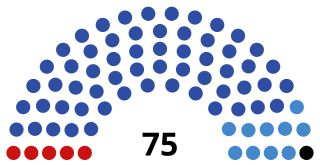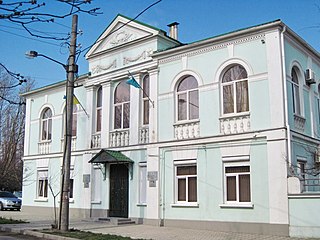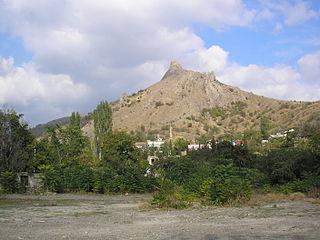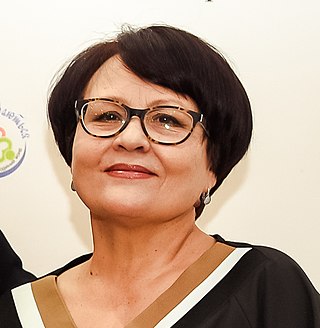Gallery
- The 1917 gathering of Qurultay near the Bakhchisaray Palace
- Members of the 1917 Qurultay of the Crimean Tatar People
- Members of the 1917 Qurultay of the Crimean Tatar People
The Qurultay of the Crimean Tatar People is a national congress and the supreme representative plenipotentiary body of the Crimean Tatar people that first met in 1917 at the Bakhchysarai Palace. [1] [2] [3] [4] [5] [6] It was there in December 1917 that the Qurultay first declared the existence of the short-lived Crimean People's Republic.
At the Qurultay, Crimean Tatars are represented by delegates elected by Crimean Tatars permanently residing on the territory of Ukraine, regardless of their nationality, as well as Crimean Tatars and members of their family who are citizens of Ukraine, regardless of their place of residence.
Credentials of Qurultay endure for five years. Delegates often represented the People's Movement of Ukraine in the Verkhovna Rada of Crimea until the Rada's dissolution in 2014.
In 2017, to commemorate the 100th anniversary of the Qurultay, the National Bank of Ukraine issued a commemorative 5 Hryven coin. [7]
Today, within Ukraine, it is officially considered a public organization of the Crimean Tatar National Movement.

Crimean Tatars or Crimeans are a Turkic ethnic group and nation native to Crimea. The formation and ethnogenesis of Crimean Tatars occurred during the 13th–17th centuries, uniting Cumans, who appeared in Crimea in the 10th century, with other peoples who had inhabited Crimea since ancient times and gradually underwent Tatarization, including Greeks, Italians, Armenians, Goths, Sarmatians, and others.

Noman Çelebicihan was a Crimean Tatar politician, lawyer, mufti of Crimean Muslims, and writer. He was the President of the short-lived independent Crimean People's Republic, established on November 26, 1917. He is known for having written the poem "Ant etkenmen", which became the Crimean Tatar national anthem. His early death at the hands of Bolshevik forces during the Russian Civil War is still commemorated in the Crimean Tatar nation.

Islam in Ukraine is a minority religious affiliation with Muslims representing around 5% of the total population as of 2016. The religion has a long history in Ukraine dating back to Berke Khan of the Ulug Ulus in the 13th century and the establishment of the Crimean Khanate in the 15th century.

Mustafa Abduldzhemil Jemilev, also known widely with his adopted descriptive surname Qırımoğlu "Son of Crimea", is the former Chairman of the Mejlis of the Crimean Tatar People and a member of the Ukrainian Parliament since 1998. Commissioner of the President of Ukraine for the Affairs of the Crimean Tatar People (2014–2019). He is a member of the Crimean Tatar National Movement and a former Soviet dissident.

The flag of Crimea is the flag of the Autonomous Republic of Crimea in Ukraine and the Republic of Crimea controlled by Russia. The flag was officially adopted on 24 September 1992 as the flag of the Republic of Crimea, readopted on 21 April 1999, then readopted on 4 June 2014 as the flag of the Republic of Crimea, annexed by the Russian Federation.

The State Council of Crimea is the parliament of Russian administered Republic of Crimea. It claims to be a continuation of the 'Supreme Council of Crimea' following a vote by the Ukrainian parliament to dissolve the Supreme Council of Crimea. The Parliament is housed in the Parliament building in the centre of Simferopol.

The Mejlis of the Crimean Tatar People is the single highest executive-representative body of the Crimean Tatars in period between sessions of the Qurultay of the Crimean Tatar People. The Mejlis is a member institution of the Platform of European Memory and Conscience.

The Crimean People's Republic or Crimean Democratic Republic was a self-declared state that existed from December 1917 to January 1918 in the Crimean Peninsula. The Republic was one of many short-lived states that declared independence following the 1917 Russian Revolution caused the collapse of the Russian Empire. The Crimean People's Republic was the first Turkic and Muslim democratic republic in the world.

The Taurida Soviet Socialist Republic was an unsuccessful attempt to establish a Soviet republic situated in the Crimean Peninsula part of Soviet Russia. The republic was established by Bolsheviks Jan Miller and Anton Slutsky who previously participated in the Petrograd Bolshevik Revolution.

Refat Abdurahman oglu Chubarov is a Crimean politician and public figure, leader of the Crimean Tatar national movement in Ukraine and worldwide.
Qurultai-Rukh is a regional organization of the People's Movement of Ukraine and a regional council's faction that consists of members from the Qurultay of the Crimean Tatar People in the Supreme Council of Crimea. The association of Crimean Tatars with the People's Movement of Ukraine started back in 1998. The faction supported the signing of the Ukrainian association with the European Union.

Mizhrichchia or Mezhdurechye is a village in the Sudak Municipality of Crimea, a territory recognized by a majority of countries as part of Ukraine and annexed by Russia as the Republic of Crimea.

Ahtem Chiygoz is a Ukrainian Crimean Tatar politician. He is the Deputy Chairman of the Mejlis of the Crimean Tatar People, a People's Deputy of Ukraine in the current convocation, Chairman of the Bakhchysaray regional Mejlis, and delegate to the Qurultay of the Crimean Tatar People.

Refat Fazylovich Appazov was a Soviet-Crimean Tatar rocket scientist and colleague of Sergei Korolev who served as head of the ballistics department of Energia from 1961 to 1988. Unlike most Crimean Tatars, he was spared special settler status and exile to Central Asia since the authorities forgot to include him in the deportation due to being in Izhevsk at the time. As a result, he was left cut off from the rest of Crimean Tatar society in the Soviet Union for much of his life. Nevertheless, he managed to become an engineer in OKB-1 and later a teacher at the prestigious Moscow Aviation Institute despite repeatedly facing discrimination. After keeping quiet about his Crimean Tatar identity for most of his life, he became heavily involved in the right of return movement after seeing the 1987 announcement about the conclusion by the Gromyko commission downplaying the entire issue and rejecting full right of return to Crimea. He went on to be a member of the second committee dedicated to considering the issue of Crimean Tatar return, which overturned the conclusions of the Gromyko commission, and in 1991 he was elected as a delegate of the Crimean Tatar Qurultay.
The OKND was an anti-communist grouping of Crimean Tatars and the successor of the Central Initiative Group in the late Soviet era. It was formed in opposition to the Leninist NDKT.

Rustem Enverovych Umierov is an Ukrainian politician, businessman, investor, philanthropist and the current Defence Minister of Ukraine. Umierov is a Muslim, and of Crimean Tatar origin.

Lilya Rustemovna Budzhurova, is a Crimean Tatar poetess and journalist. She became an Honored journalist of Ukraine in 2005.

With the dissolution of the Soviet Union and Ukrainian independence the majority ethnic Russian Crimean peninsula was reorganized as the Republic of Crimea, after a 1991 referendum with the Crimean authorities pushing for more independence from Ukraine and closer links with Russia. In 1995 the Republic was forcibly abolished by Ukraine with the Autonomous Republic of Crimea established firmly under Ukrainian authority. There were also intermittent tensions with Russia over the Soviet Fleet, although a 1997 treaty partitioned the Soviet Black Sea Fleet allowing Russia to continue basing its fleet in Sevastopol with the lease extended in 2010. Following the impeachment of the relatively pro-Russia Ukrainian President Viktor Yanukovych, Russia invaded Crimea, overthrew the elected Autonomous government and claimed to annex it in 2014.

Squatting in Crimea, also called the Samozakhvat is the ongoing process of illegal occupation of land in Crimea. In the Ukrainian media, squatting is primarily discussed in regards to Crimean Tatar returnees, though most squatters are Slavs. The process, which began in the late 1980s following exiled Crimean Tatars being granted the right to return to the Crimean peninsula, has been caused by the inability of the Ukrainian and Russian governments to efficiently give land grants to Crimean Tatars. As a result of the slow process, many Crimean Tatars have turned to erecting impromptu structures on undeveloped land.

İlmi Rustem oğlu Ümerov is a Crimean Tatar politician currently serving as deputy leader of the Mejlis of the Crimean Tatar People since 2015. He previously served as Deputy Chairman of the Verkhovna Rada of Crimea from 2002 to 2005, head of the Bakhchysarai Municipal State Administration from 2005 to 2014, and as Deputy Prime Minister of Crimea from 1994 to 1997.